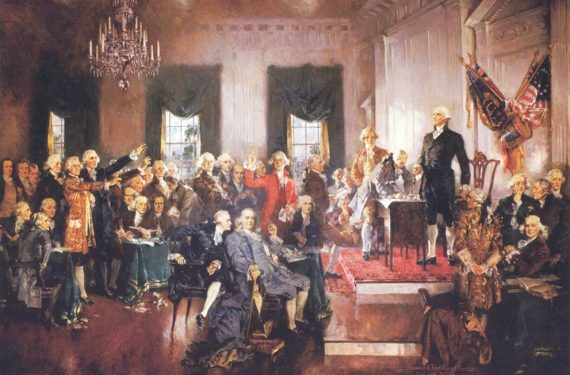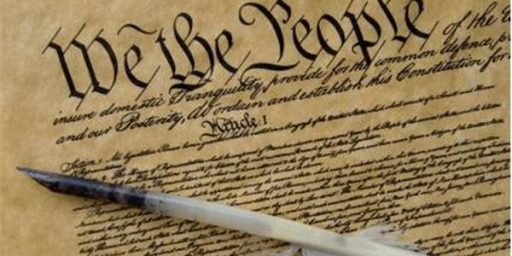Thoughts About The Constitution On Constitution Day
Where do we stand after 224 years?
Two Hundred Twenty-Four years ago today, the Constitutional Convention in Philadelphia, originally called merely to amend the Articles Of Confederation, ended after a summer’s worth of hammering out an entirely new system of government for the United States. Today, the nature of that document and the government it created is at the center of the national political debate in a way it hasn’t been in a long time:
In the 100 years since Constitution Day was first established, most Americans have lumped it with holidays like Grandparents’ Day and Administrative Assistants’ day — a noble cause, lightly observed.
But this year, with the Tea Party making the Constitution sexy again, the holiday (which, for those rusty on their civics, falls on Saturday) has become occasion for battle.
Tea Party groups, armed with lesson plans and coloring books, are pushing schools to use the day to teach a conservative interpretation of the Constitution, where the federal government is a creeping and unwelcome presence in the lives of freedom-loving Americans.
Progressive groups, accusing the Tea Party of selectively reading the founding document, have responded with a campaign to “take back the Constitution.” They are urging Americans and lawmakers to sign a pledge to honor the whole Constitution, even the parts many Tea Party supporters would prefer to ignore — say, the amendments allowing an income tax, and granting birthright citizenship. And they are trying to get people to see the Constitution not as a limit on federal power but as the spirit behind progressive laws.
The struggle over the holiday is yet another proxy in the fight over the proper role of government. On one side are those who embrace an “originalist” view of the Constitution, where New Deal judicial activism started the country down the path to ruin. On the other are those who say that its language — allowing Congress to levy taxes to provide “for the general welfare,” to regulate commerce, and to do what is “necessary and proper” to carry out its role — affirms the broad role of the federal government that has developed over the last 100 years.
“It has evolved to the point where it seems many in the Tea Party believe the entire 20th century is unconstitutional,” said Doug Kendall, the president of the Constitutional Accountability Center and a leader of the progressive coalition behind the effort to, in his words, “rebut the fairy tales being peddled by the Tea Party.”
This may seem like a fight reserved to costumed Revolutionary War re-enactors — or Ron Paul supporters, who will commemorate the holiday, as they have the anniversary of the Boston Tea Party, with a fund-raising event. But the question of who owns the Constitution has very current implications in the fights over Social Security and Medicare, and most immediately, in the court challenges to the health care overhaul that Democrats passed and Tea Party supporters loathe.
In addition to those Tea Party events marking the day, there’s something new from a group calling itself Constitutional Progressives, who have unveiled something they call the “Whole Constitution Pledge”:
Through the Constitution, “We the People” created the most enduring government charter in world history.
Building on the achievements of the Founding generation, successive generations of Americans have created a “more perfect union” through constitutional Amendments. These Amendments have improved our Constitution by ending slavery, enshrining guarantees of equality and citizenship, expanding the right to vote, and ensuring that the national government has the power and resources necessary to protect the nation, address national challenges and secure civil rights.
Some have advocated repeal of Amendments, including the 14th Amendment, the 16th Amendment, and the 17th Amendment, that make our Constitution better and this country great. Some have even failed to heed the lessons of the Civil War and the Civil Rights Movement and have advocated a return to ideas of secession and nullification.
I believe that our Constitution has been improved by the Amendments adopted over the last 220 years.
I pledge to support the whole Constitution.
As Ed Whelen argued yesterday, though, this pledge is entirely nonsensical:
From its text, it appears that the pledge is aimed primarily against those persons who “have advocated repeal of Amendments, including the 14th Amendment,[*] the 16th Amendment, and the 17th Amendment, that make our Constitution better and this country great.” But it’s one thing to oppose the substance of proposed constitutional amendments, and quite another to insinuate that those who try to avail themselves of the formal amendment process set forth in Article V of the Constitution itself don’t believe in the “whole Constitution.”
Indeed, the pledge itself celebrates those previous “generations of Americans” who “have created a ‘more perfect union’ through constitutional Amendments.” So unless the pledge organizers maintain that those previous generations did not believe in the “whole Constitution” (since they acted to amend it), they can hardly make the same charge against those seeking to amend it now.
In other words, there isn’t a single part of the Constitution that is set in stone. Theoretically, each one of them could be repealed or modified through the Amendment process set forth in Article V. Pledging to support the “Whole Constitution,” necessarily means supporting the right of the people to amend it in the future through the means provided in the Constitution. The question of what provisions should be repealed, or what other changes should be made, is a policy question only and part of a debate that we’ve been having in this country since the days of Hamilton and Jefferson. Any argument that advocating such changes means one doesn’t support the “Whole Constitution” is pure sophistry.
There really isn’t a right or a wrong way to mark Constitution Day. In fact, it’s your Constitutional right to completely ignore it you so choose. However, it’s as good at time as any to renew the eternal debate that began nearly the minute the delegates walked out of Independence Hall on that September day so long ago. Both sides of the debate seem to think that determining what the Constitution means is a simple matter, but it really isn’t. Even an appeal to the intent of the Founders runs into the problem that all the Founders didn’t agree with each other and that, even early on in the Founder’s time, the seeds for the expansion of Federal power had already been laid.
As early as 1791, President Washington’s cabinet was debating Alexander Hamilton’s recommendation to create a nationally chartered bank. Jefferson and his allies in the cabinet objected on the ground that there is no authority granted in the Constitution for Congress to charter a bank. Hamilton and his allies argued that the powers of Congress expanded beyond the mere specific grants of authority in the Constitution and included “attainment of the ends…which are not precluded by restrictions & exceptions specified in the constitution.” Strictly reading the letter of the Constitution, it would seem that Jefferson had the better argument here. If the Convention had wanted to grant Congress the authority to charter a bank, they would have done so. The fact that Hamilton lost most of the arguments for expanded Federal power that he made during the course of the Convention should have made it fairly apparent that what he was suggesting was not contemplated in the Constitutional text. Washington, who sat as President of the Convention, sided with Hamilton. The Bank bill passed Congress easily, and within the first two years of the new government’s existence the strict constructionist view of the Constitution had suffered a significant, some might say intellectually fatal, defeat.
When the re-chartering of the Bank of the United States finally made it’s way to the Supreme Court in 1819, the Court essentially adopted Hamiton’s view and utilized the Necessary and Proper Clause to expand the powers of Congress beyond those strictly set forth in Article I, Section 8:
We admit, as all must admit, that the powers of the Government are limited, and that its limits are not to be transcended. But we think the sound construction of the Constitution must allow to the national legislature that discretion with respect to the means by which the powers it confers are to be carried into execution which will enable that body to perform the high duties assigned to it in the manner most beneficial to the people. Let the end be legitimate, let it be within the scope of the Constitution, and all means which are appropriate, which are plainly adapted to that end, which are not prohibited, but consist with the letter and spirit of the Constitution, are Constitutional.
Something similar happened with respect to the Commerce Clause, which plays a central role in the debate over the individual mandate, the seeds for the massive expansion of Federal power were laid very early in America’s history. In 1824, the Supreme Court defined Congressional power under this clause as:
The power to regulate; that is, to prescribe the rule by which commerce is to be governed. This power, like all others vested in Congress, is complete in itself, may be exercised to its utmost extent, and acknowledges no limitations, other than are prescribed in the constitution………….0The wisdom and the discretion of Congress, their identity with the people, and the influence which their constituents possess at elections, are, in this, as in many other instances, as that, for example, of declaring war, the sole restraints on which they have relied, to secure them from its abuse. They are the restraints on which the people must often they solely, in all representative governments.
Within thirty-five years after the first government elected under the Constitution took office, the ground work had been laid for the massive expansion of the power of Congress. All that was necessary were the right circumstances to come along. When the Progressive Era and Great Depression occurred, those circumstances came around. Even before then, though, the Federal Government often acted outside the strict confines of the Constitution. Thomas Jefferson acquired 828,000 square miles of land from France without a specific grant of authority to do so, for example. Much of the history of the government before the Civil War included efforts to obtain benefits for private industry in the name of economic expansion. And Abraham Lincoln repeatedly exceeded the strict limits of Constitutional authority during the Civil War. The point is that the idea of a government that lives only within the strictly construed confines of Article I, Section 8 is something that has only really existed on paper, it has never really existed in the history of the United States.
This didn’t happen because of some vast Wilsonian conspiracy as the Glenn Becks of the world might postulate. It happened, mostly, because the American people wanted it to happen. The New Deal, the Great Society, yes even ObamaCare all passed with substantial public support, or with a demand from the public that the government do something about a problem. Concerns about Constitutional limitations rarely enter the public mind and, when they do, they’re often informed by a view of the Constitution and history that has little to do with reality. More importantly, when the public wants something arguments that the government can’t do it are rarely persuasive. It all brings to mind this story:
At the close of the Constitutional Convention, a woman asked Benjamin Franklin what type of government the Constitution was bringing into existence. Franklin replied, “A republic, if you can keep it.”
That is really the place we find ourselves in today. We have a massive Federal Government that clearly does more than just act within the strict confines of the Constitution mostly because that’s what the American people wanted. In that sense, Alexander Hamilton has, for the moment, won the debate that started in a cabinet meeting in New York in 1789. The debate will go on, however, as it has from the beginning.







There is one thing set in stone: we can’t eliminate equal representation in the Senate, even by ammendment.
If you’re celebrating the constitution, you really have to take a moment to also remember that it enshrined slavery, and empowered the slave holding states by giving them representation for 3/5ths of the people held in bondage.
The founding fathers didn’t create a perfect document, they created a messy compromise, incrementally better than what was there before.
We would do well to remember that, and follow in their footsteps, rather than putting them on a pedestal and assuming they were right about everything.
@Stormy Dragon: Sure we can. Just craft an amendment saying so. “Each state shall be represented by Senators, the number of which shall equal the number of letters in the name of each state, in its most common form. For example, Rhode Island shall have eleven Senators, New Hampshire twelve, Iowa four, California ten, and so on.”
My main problem here is that the Massholes will end up with 13…
J.
@Gustopher: No, the most important thing is to remember that they knew they didn’t craft a perfect document. They not only set up a system to amend it that was just hard enough to keep it from being used too frivolously (let’s pretend Prohibition never happened), and immediately demonstrated how it worked by passing the Bill Of Rights. They essentially gave us “institutionalized revolution,” and it’s stood us in fine form ever since.
J.
@Jay Tea: North Carolina and South Carolina would have 13 senators each, based on number of letters.
@Jay Tea:
No we can’t. Article V:
@Stormy Dragon: Son of a bitch. Stormy, I’ve read the Constitution countless times, but that little clause slipped my memory. Thanks.
I don’t mind being corrected, but I am miffed that you killed my little whimsical example. I was proud of that one, dammit…
And by my reading, since we’re past 1808, that is the ONLY restriction on Amendments. Nicely played, sir. Pardon me while I go put on a hat, so I can doff it to you.
J.
The constitution has become a sacred document – it’s not. It’s not surprising that the most rabid supporters of the constitution are also rabidly religious. It’s also not a surprise that they don’t understand the constitution any better than they understand their own Bible and that they cherry pick both so they see what they want to see.
@Jay Tea:
Interesting hypothetical with that clause: would it permit an ammendment eliminating the Senate entirely? If no one has representation in the Senate at all, does that count as “equal suffrage”?
@Stormy Dragon: Interesting theory: I think it’s above my pay grade. But let’s start off by making it one per state. Think of what we’ll save in salaries, benefits, and staffing…
J.
@Stormy Dragon: So you propose 2 amendments, the first which removes that clause from Article V (nothing says you can’t amend Article V), and the second which changes the representation in the Senate.
@Michael:
Since the first ammendment has no purpose other than allowing you to violate the clause, I’m pretty sure it would be disallowed by the clause as well.
@Stormy Dragon:
What in the Constitution Cannot Be Amended?
@Stormy Dragon: The key phrase is “without it’s consent.” If all the states agreed to abolish the Senate, or if an individual state (presumably via concurrence of all of its citizens) agreed to forgo Senate representation, then the Senate or Senators would be gone.
Stormy, again I appreciate your correcting me, but you’re doing one thing that is bugging the hell out of me. Could you please stop spelling “amendment” with a double “m?”
Your knowledge here is very impressive, but that little misspelling — “ammendment” — is just grating on me.
Back on topic… I think Just has it right. If the states did consent, then that section could be amended — but I really can’t conceive of all 50 states agreeing to changing the representation scheme away from equal representation.
Maybe, during the Civil War, they could have pushed through a “states that rebelled and were readmitted only get one Senator until Congress approves two” amendment, but Lincoln would likely have opposed it.
Interesting speculation…
J.
@Jay Tea:
I’mm sory. Speling isnn’t my stronng poinnt.